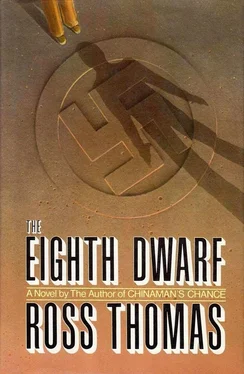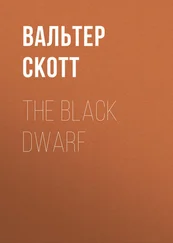“You were speaking it eagerly enough when I last saw you.”
The big man nodded gloomily. “Once again I picked the wrong horse. First the Iron Guards, then the Germans.”
“You didn’t wait for the Russians, I see.”
“They would have hanged me. The Germans made me promises, none of which they kept. I came back with them. What else could I do? Oh, God, Nicolae, how I miss Bucharest and the old days.” Two more tears rolled down the big man’s cheeks. He used the dirty handkerchief to mop them up.
“So now you’re a DP?”
“I’m not even that legally. Romania was a belligerent nation. A citizen of a belligerent nation can’t be a DP — not legally. Now I’m an Estonian.”
“You can’t speak Estonian.”
“But I speak French like a native. So I claim that I was born in Estonia, but reared in Paris. I have the authorities very confused.”
Ploscaru brought out his Old Golds and offered them to Ulescu, who smiled, shook his head, and produced a package of Camels. “I prefer these Nicolae,” he said, and lit both cigarettes with an American Zippo.
The dwarf eyed the big man more carefully. “Even as a DP Mircea, you don’t appear to have been missing many meals.”
The big man shrugged. “Because of the terrible suffering that we DP’s have undergone, the authorities feed us two thousand calories a day. It’s mostly stew, but still quite nourishing.” He changed the subject abruptly. “Did you see that old fellow kill the duck. Nicolae? Wasn’t that something? I don’t think it was his first time, do you? No, I think he comes here regularly, perhaps once a week, and goes home with a nice duck dinner.
“You’re prospering, Mircea.” The dwarf made it a flat accusation.
The big man bridled a bit. “And look at you with your nice little suit.” He fingered its material. “Tailored, of course, but then your clothes were always tailored. It couldn’t be that you’re still with British intelligence, could it, Nicolae? No, of course not. The British would never pay enough for you to be able to afford such a nice little gray suit. Possibly the Americans, eh? Someone told me that there at the end, just before the Russians came, you and the American fliers became very thick. Where have you come from Nicolae — America?”
“California.”
“Really?”
The dwarf nodded.
“Hollywood? Have you seen Hollywood?”
“I lived there for a while.”
“And the women, Nicolae. Tell me about the women. You would know them all. You always did have luck with women.”
“Beautiful.”
“Ahh.”
“But not as beautiful as in Bucharest in the old days.”
“No, of course not.”
There was a silence as the two men seemed to lapse into reverie. Mircea Ulescu stole a look at the dwarf.
“Nicolae,” he said.
“Yes.”
“I have become a thief.” The confession came out as a hoarse whisper.
“So.”
“Can you imagine it? I, Mircea Ulescu, have turned common thief.”
“Not so common, I’m sure.”
“But still a thief, even though a good one.”
“Well, one must do what one must these days. Tell me, are there many thieves at the camp?”
“It’s a den of them.”
“And what do you steal, Mircea?”
The big man shrugged. “We’re organized into gangs.” He brightened a bit “I’m the leader of mine, of course.”
“Of course.”
“We steal only from the Americans. Cigarettes, gasoline, coffee, Tootsie Rolls.” He frowned. “Can you imagine a conquering nation with a sweet called Tootsie Rolls?”
“The Americans are a strange but wonderful people, Mircea.”
“Yes, I know. Others in the camp steal from the Germans. The Poles especially. The Poles like to beat the Germans up, steal their pigs, and rape their women. But Poles are like that. They think they are justified. We, naturally — my bunch — we steal only from the Americans. And sometimes we do business with them, too.”
“Do you do business mostly with officers or with other ranks?”
“Mostly with officers.”
“I am looking for a certain officer, Mircea. At one time you were a very good policeman. Tell me, are you still?”
“I have not forgotten the old techniques. One does not forget those so easily, Nicolae.”
The dwarf nodded. “You mean the judicious bribe, the suborned witness.”
The big man shrugged again. “Those and others.”
“I was in Frankfurt for only an hour or so before I learned that any documentation that I might need for my stay here could be most readily obtained at the DP camp.”
“Ah, so that’s what you were doing there. You must have been to see Kubista the Czech. He is our best forger.”
“I believe that was his name. Are there a number of forgers in the DP camp?”
“Several, but Kubista is the best.”
“This American officer whom I spoke of. He might have use for the services of a forger. Do you think you might look into that for me, old friend? Find out whether an American officer, possibly a major, has bought himself some documents recently? There would be a little something in it for you, of course.”
“I hesitate because of friendship to ask how much is a little, Nicolae.”
“Shall we say a hundred dollars?”
“Greenbacks?”
“Of course.”
“In advance?”
“Naturally,” the dwarf said, and took out his wallet.
The butler wasn’t a very good driver. Or perhaps it was just that he wasn’t too familiar with his employer’s official UNRRA car, an Army-surplus 1941 Ford sedan with a lot of hard miles on it. He stalled frequently, grated the gears, and drove in second most of the time as though unaware of or indifferent to the third gear.
“This afternoon, Herr Doktor,” the butler said over his shoulder to Jackson, “we’ll go to inspect a proper car.”
“Fine,” Jackson said from the back seat of the Ford into which he had been ushered by an imperious gesture from the butler. Jackson wasn’t at all sure why he was being addressed as Herr Doktor, but assumed that it was some fairy tale that the dwarf had spun for the butler’s benefit. He wondered idly whether he was supposed to be a doctor of medicine or or philosophy.
“I described the car yesterday to Herr Direktor.”
“Herr Direktor?”
“The little gentleman.”
“Ah, yes,” Jackson said. “Herr Direktor Ploscaru.”
“It is a rare name for a Swiss.”
“Very rare.”
“But I think it is wonderful for a person with such a handicap as the Herr Direktor’s to achieve so important a position.”
“The best things sometimes come in small packages,” Jackson said, wincing at his own banality.
“How true,” the butler said gravely. “How very, very true.”
There was no more conversation for several blocks. Then the butler said, “I was not always a butler, you understand, Herr Doktor.”
“No?”
“No. Before the war and even during it I was a caterer in Berlin. I had my own firm. We specialized in weddings and... and certain civic affairs.” He sped over the last a bit hastily, Jackson thought.
“Then after the war, when the Americans arrived, I went to work for them in a position that entailed many grave responsibilities.”
“I’m sure.”
“It did not last.”
“What happened?”
“My brother-in-law, whom I had taken into my catering firm and taught the business, denounced me to the Americans for having been a member of the Party. I was discharged and the Americans gave my brother-in-law my job, which was what he had in mind all along.”
“Were you?”
“Please?”
“A member of the Party.”
The butler shrugged. “Naturally. As I said, my firm catered many civic affairs — receptions mostly. To be awarded such affairs, one had to be a member of the Party. It was simply a business proposition. I did not, of course, participate in its activities. I am without politics, and I thought the Party mostly foolishness. But my brother-in-law, on the other hand...” The butler’s voice trailed off.
Читать дальше












